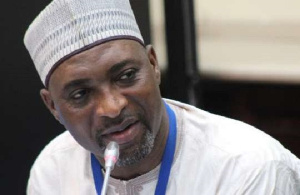Alhaji Mohammed Mubarak Muntaka, the Minority Chief Whip, has expressed his disappointment over the responses of supreme court nominee, Justice Clemence Jackson Honyenuga.
Muntaka said that he almost collapsed in his chair when the nominee was answering questions on why he praised President Nana Addo Dankwa Akufo-Addo – something that breaches the constitution.
When he appeared before the Appointments Committee of Parliament on Monday, May 11, Justice Honyenuga was asked to explain his recent endorsement of the president, who is also the presumed nominee of the incumbent party for the December general election.
President Akufo-Addo visited the chiefs and people of Afajato South District in February.
There, supreme court justice nominee Clemence Homenuga, who doubles as the Paramount Chief of the Nyagbo Traditional Area, at a durbar said: “With the vision of the President and the gains made in his first term, Ghanaians may consider giving him another four years”.
But Justice Honyenuga told the Appointments Committee of Parliament that his remarks were not necessarily to endorse the president but to wish him well in the forthcoming general elections.
“In reading that statement, we didn’t intend endorsing the president. Our understanding was that we were wishing him well…If out of political dissatisfaction some people are unhappy with whatever I am supposed to have said then I am sorry,” he said.
But the Asawase Member of Parliament told Citi News that, “If he will tell the Committee that he didn’t pay attention to the details of his statement then it goes to the very foundation of justice. It is very worrying. I almost collapsed in my chair. I don’t know if he was truly hearing himself. What he meant was that for the sake of development in his area, he may compromise himself on the bench. All those things send very worrying signals for all of us. I am really sad because I have had the privilege of vetting all the judges at the supreme court and frankly speaking what happened today at the vetting is not common. I can’t really recollect that the committee got divided because of a nominee of the supreme court. I am forced to say that he put us in a very difficult situation.”
He continued: “Judges are not superhuman, they are fallible. All we wanted him to do was to admit but it was a difficult thing. But trying to defend and run away from the fact, I don’t want to believe his handling of answers to the committee. Between man and God, I am fasting as a Muslim, when I was leaving home this morning, I knew we were coming to do our work but I didn’t know I was going to to be this sad because the nominee had forced to push at a corner that made us sad despite doing our work.”
The Minority during the vetting of the nominee asked the chairman permission to go consult further on the nominee after Joseph Osei Owusu, the chairperson of the Committee disallowed a question from Samuel Okudzeto Ablakwa.
Ablakwa had sought to ask the judge his opinion about the rules governing the conduct of judges and magistrates which Ablakwa read to Homenuga. The said rules clearly forbid judges from endorsing political aspirants/candidates.
Ablakwa, the North Tongu MP, was demanding the reason behind the nominee’s words of praise to the President since the constitution debars chiefs from engaging in partisan politics but the Chairman of the Committee overruled the question and prevented Justice Honyenuga from answering it.
Mr. Ablakwa was further demanding the reason behind the nominee’s words of praise to the president since the constitution bars chiefs from engaging in politics.
The learned judge who has been a member of Ghana Bar Association since 1982 has been a key figure in the Justice for All programme (JFA) since its inception.
Under the programme, he heard remand cases in prisons throughout Ghana, which resulted in decongestion of the prisons.
This recent faux pas has come to dent holes in his credibility, and he is struggling to extricate himself from him.
In a further dent to his credibility, Justice Honyenuga dodged a simple question a witness in his court will not be allowed by a newbie lawyer to get away with.
That moment was when MP Muntaka Mohammed Mubarak asked Justice Honyenuga who gave him the speech and whether he read through it.
The judge answered that he did not remember who gave him the speech but he read through it though he did not pay particular attention to the import of the speech.
Justice Honyenuga who was passed by a vote of 10 to 7 by the committee was adamant that he read the controversial speech on behalf of his colleague chiefs, and despite him wearing two hats – as a judge and a traditional ruler – had no personal liability or burden to bear for the fallouts of the speech.
Ghana’s laws debar chiefs from partisan politics.
This is about the first time in living memory that a judge who is also a chief has also strayed into a partisan political endorsement of a candidate for elections.
All said and done, what do our chiefs gain from these endorsements of politicians during courtesy calls, durbars and especially in campaign seasons?































